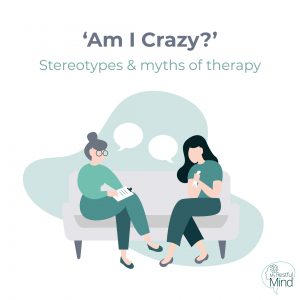As time passes by, without a doubt the awareness with regards to mental health and therapy is surely on the rise. However, there are still loads of skeptics who refuse to believe in the seriousness of the issue at hand.
There have been hundreds of articles written on therapy but it isn’t often that we see therapists openly talking about the stigmas of mental health. To cater to the issues, we decided to catch up with one of our best psychologists to answer a few of the very frequently asked questions.
Q) Exactly when and why should one see a therapist?
There is no right or wrong time to see a therapist. Engaging in therapy provides a platform to explore themes that have impacted us and invite an alternative resource to begin the conversation around life skills and responses that can assist us in our goals.
Q) Have you or anyone close to you been in therapy themselves?
Yes, therapy has helped me explore life challenges I have had to reshape the way I respond. Having assistance to explore topics related to mental health, Therapy has guided me to find new structures and skills to teach me that there is a response to all of life’s challenges.
Q) Many families tend to ignore mental health since there is a global misconception regarding it. What are your thoughts on this?
Biases are informed by cultural and societal biases. This is on top of the challenges that we face based on our identity. Thus, it is integral to move forward. We come into therapy knowing that we all carry the stigma and reinforce these things based on our own biases. Thus, it is important to think reflectively.
Q) Have techniques involving therapy evolved over the years? If yes, then how?
Therapies have evolved throughout the years to become more grounded in evidence-based approaches and research to evaluate the success of therapy. Options have expanded to identify the complexities and intersectionality of individual identity. In contrast, there is a wide array of treatment modalities that may fit better with what you are seeking. These include: emotion-focused therapy, acceptance and commitment, narrative, cognitive behavioural, rational emotive behavioural therapy, life skills, life coaching, etc.
Q) What do you typically do before seeing a patient?
The first and foremost thing I typically do is reviewing the notes of the previous meetings with the patient so we could ideally begin from where we left off in the previous session. I also review and intake information. Along with that I also tend to practice my own self-care.
Q) How do therapists usually assess progress with respect to their patients?
The easiest and most effective way of assessing progress is through clients’ feedback. We also tend to review our journals to find where we started off from and how things have panned over time. Homework is given to clients also plays a vital role in the progress hence we encourage them to complete that.
Q) What are your views with regards to online platforms that connect patients with professional therapists
Personally, I believe that it is a step in the right direction. Online platforms provide spaces for clients to feel more comfortable and safe in their own space. It helps reduce certain barriers like transportation etc. Most importantly, online platforms create value because of their convenience.







